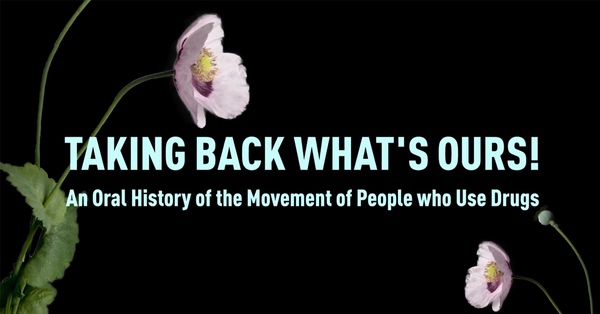¡Recuperando lo que es nuestro! – Un recuento oral del movimiento de personas que consumen drogas
Drugreporter y el INPUD documentan cómo las personas que consumen drogas en todo el mundo se han organizado para proteger y defender los derechos de su comunidad. Más información, en inglés, está disponible abajo.
In this 10-episode series, Drugreporter and INPUD document how people who use drugs around the world have organised and formed collectives and unions to protect and defend the health and human rights of their community.
Episode 1: The Netherlands, Belgium and France
Since January 1981, when the first drug user group ‘Junkie-bond’ was established in Rotterdam in the Netherlands, the drug user movement has grown exponentially: people who use drugs have continued to organise and form collectives and unions to protect and defend the health and human rights of their community. This struggle for autonomy, self-determination and empowerment of people who use drugs has been, and is, a global phenomenon.
Episode 2. Canada
In the early ‘90s the Vancouver Area Network of Drug Users (VANDU) was formed in response to the HIV crisis and overdoses among people who use drugs. The tireless work of Ann Livingston and VANDU contributed to significant changes in how people who use drugs were treated in the city. Among the various harm reduction services that formed, they contributed to the opening of the first legal drug consumption room in North America and trials with heroin prescription programs.
With the emergence of fentanyl in the illegal drug market, the overdose epidemic skyrocketed, and in 2018, more than 10,300 Canadians died as a result of an apparent opioid-related overdose. Activists like Zoë Dodd from the Toronto Drug Users Union and the Toronto Overdose Prevention Society reacted by opening up illegal overdose prevention sites, saving many, many lives. Their civil disobedience has changed the landscape of Canadian Drug Policy: those illegal sites eventually became legal.
Many people are still dying every day in Canada, and drug user activist groups like VANDU, the BC-Yukon Association of Drug War Survivors, and the Canadian Association of People Who Use Drugs (CAPUD) are fighting for a safe drug supply, so people in need have access to an unpolluted source of their drug of choice.
Episode 3. Germany, Denmark and Norway
This year JES network in Germany celebrated its 30th anniversary, and is one of the oldest drug user groups in the world. Dirk Schäffer – a member of the network – tells us how with the support of Deutsche Aidshilfe, the JES drug user network contributed to the availability of harm reduction services in Germany, including drug consumption rooms and heroin prescription programs.
The drug user groups in Denmark and Norway were also crucial to achieve the opening of these kinds of life-saving services in their own countries. The Danish Drug Users Union (Brugerforeningen), under the leadership of Jørgen Kjær, has been a model for drug user organisations all over the world. The drug user groups in Norway, led by Arild Knutsen from the Association for Humane Drug Policy, have changed the drug policy landscape significantly. Drug consumption rooms are available, heroin prescription and other innovative substitution programs are planned, and a major drug policy change is happening right now, with a move away from punitive measures and towards a more humane and evidence based decriminalisation model, based on the experiences of Portugal.
Episode 4. South Africa
The rapid development of harm reduction services in recent years in South Africa has largely been influenced by the movement of people who use drugs in the country. 10 years ago, there was no needle exchange program in the country, and now there are multiple, providing 2 million sterile syringes a year for people who inject drugs. The South African Network of People who Use Drugs, supported by the non-governmental organisation TB HIV Care, tirelessly campaigns for the humanisation of people who use drugs. They managed to change the aim of the South African drug strategy to focus on providing support for problematic drug use, rather than creating a drug free society. People who use drugs are consulted when developing the country’s drug strategy. Their advocacy for visible policing resulted in fewer arbitrary arrests, and the South African Police Services stopped the use of quota systems, which required a certain number of drug users to be arrested. There is still a lot to do to end the criminalisation of people who use drugs, and to end the racial injustice and discrimination of women, which are widespread in the country. Watch the film featuring Angela McBride, Nelson Medeiros, and Shaun Shelly of SANPUD.
Disclaimer: SANPUD believes in representativity and diversity. This film features three of the four founders and does not reflect the current diversity of the board, staff, or membership of SANPUD.
Episode 5. United States of America.
Activists from the United States look back on the history of the movement of people who use drugs in the fifth episode of the documentary series produced by INPUD and Drugreporter.
In the country where the drug war was born, people who use drugs have fought for their dignity and human rights for decades. They have achieved the legalisation of needle and syringe exchanges in many states, successfully campaigned for hepatitis C treatment, and fought hard against the extremely harsh criminalisation of drug use around the US. In the US last year 70 thousand people died of overdose, and it is activists who, with the leadership of Dan Bigg, have made naloxone widely available. There is even an underground safer consumption facility somewhere in the United States, which is saving lives at this very moment.
In today’s episode you can witness the oral history of the users’ movement, as told by Louise Vincent from the Urban Survivors Union (USU), Hollis, who for a long time worked at the San Francisco Drug Users Union, and from Robert Suarez, who is a long-time activist at VOCAL-NY and USU.
